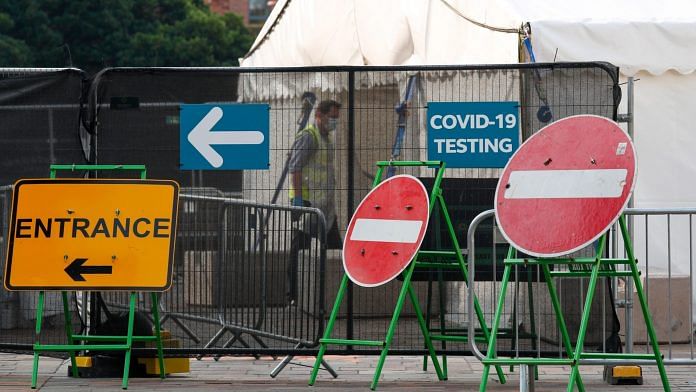New Delhi: A new human challenge trial has been launched in the UK to study the immune response required to protect people against Covid-19 reinfection.
In a human challenge trial, according to the World Health Organization, “participants are intentionally challenged (whether or not they have been vaccinated) with an infectious disease organism”. Accordingly, participants of the UK study will be infected with Covid-19 to study their immune response.
The study, which was announced Monday, will be spearheaded by researchers from Oxford University, who will begin recruiting participants in the next few weeks.
“The point of this study is to determine what kind of immune response prevents reinfection,” said Helen McShane, a professor of vaccinology at the University of Oxford and chief investigator of this study.
McShane said her team will be measuring the immune system response of the study’s participants, which would include T-cells and antibodies.
Also read: Covid-19 pandemic: Israel eases mask rules, UK studies if vaccines cover Indian variant
Study participants to be infected with Covid
For the study, participants have to be healthy, aged between 18 and 30 years, and must have been infected with Covid-19 earlier.
The first phase of the trial will include 24 participants, who will be split into groups of three to eight people. These groups will then receive the original strain of the virus via the nose.
“Our target is to have 50 per cent of our subjects infected but with no, or only very mild, disease,” said McShane.
She added that once the correct amount of dose required for infection is determined, 10 to 40 other participants will be infected.
Then, in the second phase, which is expected to start in the summer, a new set of participants will be administered the dose.
Researchers will study their immune response before and after exposure to the virus and examine the symptoms of those infected.
If the participants get reinfected or symptoms develop through the trial, they will be given a monoclonal antibody treatment. The participants will be granted around £5,000 for this study and will be quarantined for at least 17 days around the dates of the trial.
According to the study team, the research will not only help determine the level of immune response required to prevent reinfection but will also aid development of treatment and vaccines.
“If we can determine the level of immune response above which an individual cannot be infected, then that will help us determine whether new vaccines will be effective without necessarily having to test them in phase three efficacy trials,” said McShane.
Also read: At 5.2 million infections, global Covid-19 cases hit record-high since start of pandemic
Human challenge trials on Covid
Human challenge trials have proven to aid medical research in the past. These trials have been successful in understanding the body’s immune response to diseases such as tuberculosis and gonorrhoea.
However, it was only this year that the first human challenge trial on Covid-19 was started. It was led by researchers at Imperial College London and commenced early this year. It investigated the smallest amount of virus, which was needed to cause infection among people who hadn’t contracted the disease before.
Such trials had not been undertaken earlier because US infectious diseases expert Anthony Fauci had said in July 2020 conducting human challenge studies was “not essential or ethically justified” at the time since enough wasn’t known about the disease.
Also read: How volunteers have made social media the national Covid ‘helpline’ for beds, oxygen, plasma



